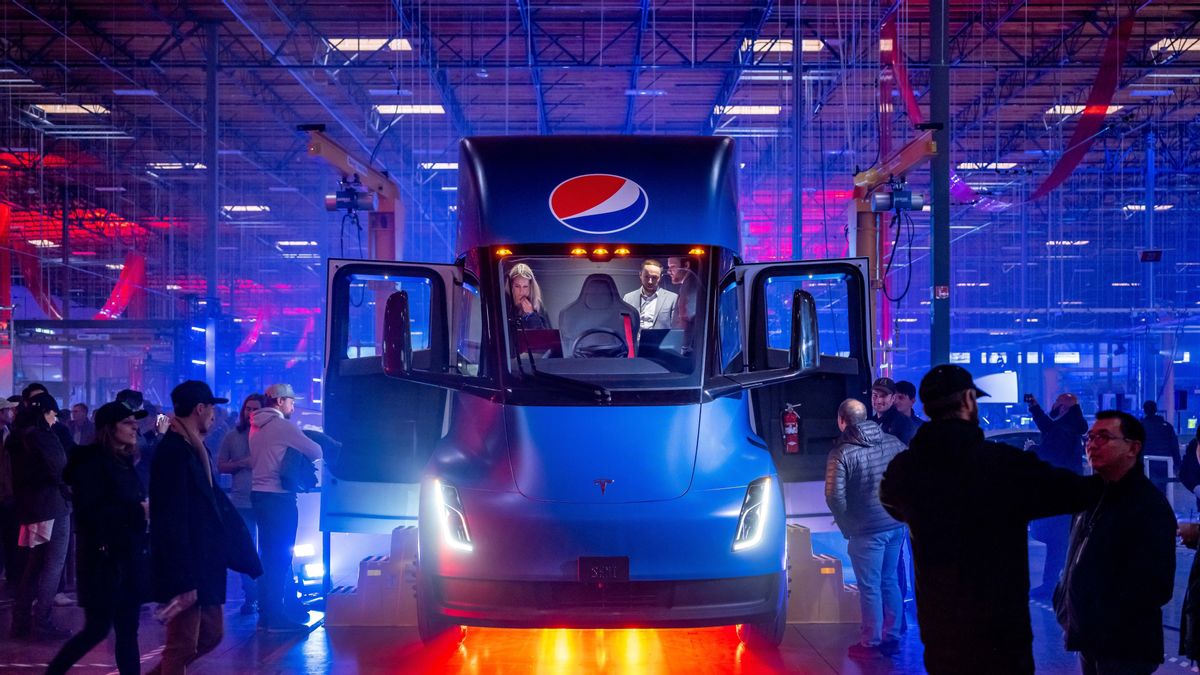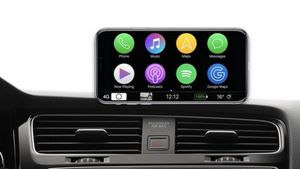JAKARTA - PepsiCo plans to launch 100 Tesla Semis heavy-duty trucks by 2023. This policy comes when they will start using electric trucks to deliver to customers such as Walmart and Kroger.
According to fleet officials from the drinking company in sods to Reuters on Friday, December 16, PepsiCo Inc, which ordered a large truck in 2017, is now buying it "directly" and also increasing its plant.
This includes installing four Tesla Inc (TSLA.O) 750 kilowatt charging kiosks in Modesto and Sacramento, California, "said Vice President PepsiCo, Mike O'Connell in an interview. State grants amounting to US$15.4 million and federal subsidies of US$40,000 per vehicle helped in offsetting some of the costs.
"This is a great starting point for electricity," said O'Connell, who oversees the company's vehicle fleet.
"Like any other initial technology, incentives help us build programs," he said, as quoted by Reuters. He also added that there are "many" development and infrastructure costs.
PepsiCo is the first company to experiment with an electric truck, Tesla Semis, battery-powered as a way to reduce its environmental impact.
United Parcel Service Inc and food delivery company Sysco Corp have also ordered the truck, while retailers Walmart Inc are testing alternative vehicles.
PepsiCo's plan to use Semis has been reported, but O'Connell provides new details on how the company uses it and its timeline. Tesla Chief Executive Elon Musk initially said the truck would be produced in 2019 but was delayed due to battery constraints.
PepsiCo said it would deploy 15 trucks from Modesto and 21 from Sacramento. It's unclear where the others will be based but O'Connell said the company was targeting the launch of the next Semis in the central United States, and then the East Coast.
The company's Frito-Lay Division sells snack products, making it a good candidate for electric trucks, which have heavy batteries that can limit cargo capacity.
"Tesla Semis will transport Frito-Lay food products about 425 miles (684 km), but for heavier soda loads, the truck will initially travel shorter by about 100 miles (160 km)," O'Connell said.
The PepsiCo will then also use Semis to transport drinks in "a range of 400 to 500 miles as well," said O'Connell.
"Squeezing a trailer full of chips is not the most intense and difficult request," said Oliver Dixon, senior analyst at Guidehouse's consultant.
"I still believe that Tesla has a lot to prove to the broader commercial vehicle market," Dixon said, citing Tesla's reluctance to provide information about payloads and prices.
PepsiCo has allocated several trucks planned for the Sacramento location for delivery to Walmart and wholesalers such as Kroger Co (and Albertsons Cos Inc. Trucks at the Modesto Frito-Lay factory have just gone to the PepsiCo distribution center, O'Connell said.
All Semis heading to PepsiCo will have a range of 500 miles (855 km). O'Connell added that he didn't know when Tesla would start deploying a 300-mile (480 km) truck. When Tesla started building it, PepsiCo "will turn it" into its fleet, O'Connell said.
PepsiCo declined to share details about the price of the truck, an undisclosed figure by Tesla. Competing vehicles sell for $230,000 to $240,000, said Mark Barrott of consulting firm Plante Moran. He added that Tesla Semi with a range of 500 miles could be priced higher as its 1,000 kilowatt-hour battery pack (kWh) is roughly twice as large as many of its competitors.
"We guarded the truck for one million miles, seven years," O'Connell said. "Operational costs will be paying back from time to time."
The custodian also declined to share specifics about the weight of the truck, another closely guarded secret by Tesla.
He said Tesla did not help pay the truck mega charger but provided design and engineering services for the facility, which is equipped with a solar and battery storage system.
O'Connell said that a 425-mile (684 km) journey carrying Frito-Lay products made Tesla Semis batteries drop to about 20%, and refills take about 35 to 45 minutes.
The English, Chinese, Japanese, Arabic, and French versions are automatically generated by the AI. So there may still be inaccuracies in translating, please always see Indonesian as our main language. (system supported by DigitalSiber.id)













